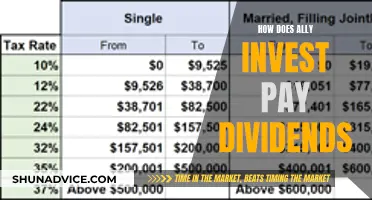
If you're looking to invest 400k, there are a few options to consider. Firstly, it's important to determine your level of risk tolerance and whether you want to manage the investment yourself or seek professional advice. Diversifying your portfolio across various assets such as stocks, bonds, property, and funds can help minimise risk. Additionally, consider the time frame for your investment and whether you're comfortable with a long-term or short-term investment strategy. It's also crucial to keep costs and taxes in mind, as they can impact your overall returns. Monitoring and reviewing your portfolio regularly is essential to making adjustments and optimising your investment strategy. Seeking advice from an independent financial advisor can provide personalised guidance based on your circumstances and goals.
| Characteristics | Values |
|---|---|
| Investment Options | Stocks and Shares, Property, Bonds, Mutual Funds, Exchange-Traded Funds, Savings Accounts, Peer-to-Peer Lending, Gold, High-Interest Current Accounts |
| Investment Risk | High, Very High, Balanced, Low, Very Low |
| Investment Timeframe | Short-term, Medium-term, Long-term |
| Investment Amount | £400k |
What You'll Learn

Stocks and shares
If you are looking to invest £400k right now, one option is to put your money into stocks and shares. This is generally thought of as a long-term investment strategy, but it is possible to create a regular income stream from stocks and shares by investing exclusively for dividends. Many companies pay out dividends to investors as a reward for holding their shares. While these amounts are typically not enormous, investors receive a dividend for each share they own. For example, Coca-Cola announced a dividend of $0.44 a share for investors in April 2022. So, investors who have 100 shares in Coca-Cola will receive $44 in July on the payment date.
Dividends can be ideal for producing a passive income because, as long as the company pays dividends to shareholders, it doesn’t matter what the value of your actual shares is. Share prices could fall in value while you hold them and you’d still potentially receive dividends. However, it’s important to note that companies can suspend dividend payments at any time in response to certain factors, such as poor company performance and reduced profits.
When investing in stocks and shares, it is important to keep in mind the impact of Dividend Tax. While you do have a Dividend Allowance (currently £2,000 in the 2022/23 tax year) before tax is due, gains from dividends are taxed separately, according to your marginal rate of Income Tax. The Dividend Tax rates in 2022/23 are:
- 8.75% for basic-rate taxpayers
- 33.75% for higher-rate taxpayers
- 39.35% for additional-rate taxpayers
One way to avoid Dividend Tax is to hold your investments in a Stocks and Shares ISA, from which any gains are entirely tax-free.
If you are looking for stocks to buy now, Meta Platforms (META), Goldman Sachs (GS), Granite Construction (GVA), Universal Health Services (UHS) and Booking (BKNG) are prime candidates. These stocks all boast impressive relative strength and are expected to generate massive gains.
Invest in IoT's Future Today
You may want to see also

Property
Residential Property
Residential property can be a good source of regular income in the form of monthly rent payments. To generate income from a residential property, you can rent it out to a family, students, holidaymakers, or businesses. To maximise your income, choose properties with the best rental yields. Holiday homes and student properties, for example, tend to have lower property costs and higher, more consistent rental yields.
Commercial Property
You can also generate income by investing in commercial property and renting it out to businesses.
Capital Growth
The other way that property investments generate income is through capital growth over time. However, property values tend to increase over years, rather than months, and this value is illiquid – you can't access your money without selling the property. Therefore, targeting growth in the value of your property is not a good strategy if you're seeking a regular income.
Downsides of Investing in Property
Before investing in property, it's important to be aware of the potential drawbacks. Firstly, there's the cost of the property itself, as well as other costs such as mortgage payments, stamp duty land tax, capital gains tax, and management and administration costs. There's also the risk of not finding tenants for your properties, which can be particularly problematic if you have a mortgage to pay.
Real Estate Investment Trusts (REITs)
If you want to invest in property but are put off by the high costs, you could consider investing in property through real estate investment trusts (REITs). With REITs, you pool your money with other investors and receive dividend payments based on the trust's performance.
Pros and Cons of Investing in Property
Pros
- Potential for steady income from rent payments while the property itself grows in value.
- Tangible asset, rather than being “theoretical” like stocks, shares, or other investments.
- Option of investing in REITs rather than buying property outright.
Cons
- Can be expensive to get started, particularly when buying without a mortgage.
- Ongoing costs could reduce how much income you receive.
- Risk of not finding tenants, meaning you won't receive any regular income from rent payments.
GME Investors: Who's In?
You may want to see also

Bonds
There are three major types of bonds: corporate, municipal, and treasury bonds. Corporate bonds are debt instruments issued by a company to raise capital for initiatives like expansion and research and development. The interest you earn from corporate bonds is taxable, but they usually offer higher yields than government or municipal bonds to offset this disadvantage. Municipal bonds are issued by a city, town, or state to raise money for public projects such as schools, roads, and hospitals. The interest you earn from municipal bonds is generally tax-free. Treasury bonds (also known as T-bonds) are issued by the US government and are considered risk-free. They are backed by the full faith and credit of the US government, but they don't yield interest rates as high as corporate bonds. While treasury bonds are subject to federal tax, they are exempt from state and local taxes.
When investing in bonds, it is important to know when bonds mature, investigate the bond issuer's track record, understand your tolerance for risk, and factor in macroeconomic risks.
Saudi Women's Rights: Investors' Dilemma
You may want to see also

Peer-to-peer lending
P2P lending is a good option for those who want to get better returns on their cash savings than they would from a bank savings account or certificate of deposit. It is also a good option for borrowers who are looking for an alternative to traditional banks or lower interest rates.
- An investor opens an account with the site and deposits a sum of money to be dispersed in loans.
- The loan applicant posts their financial profile, which is assigned a risk category that determines the interest rate they will pay.
- The loan applicant can then review offers and accept one. It is possible to break up the request and accept multiple offers.
- The money transfer and monthly payments are handled through the platform. The process can be entirely automated, or lenders and borrowers can choose to negotiate.
Some P2P lending sites allow lenders to start with an account balance of as little as $25. However, it is important to note that P2P lending is riskier than a savings account or certificate of deposit. The default rates for P2P loans are much higher than those in traditional finance, sometimes exceeding 10%.
Additionally, P2P lending is not covered by the Financial Services Compensation Scheme (FSCS). This means that if the provider experiences financial trouble, investors will not be able to get their money back.
Despite the risks, P2P lending can be a good option for those looking for higher returns on their investments. It is also a good alternative for borrowers who may not qualify for loans from traditional banks.
Carnival Cruise: Invest Now?
You may want to see also

Savings accounts
BrioDirect High Yield Savings Account
Offers a competitive yield of 5.30% APY. Requires a minimum opening deposit of $5,000 to open. No monthly maintenance fee.
TAB Bank High Yield Savings
Offers a competitive yield of 5.27% APY. No minimum opening deposit required and no monthly maintenance fee.
UFB Direct Secure Savings
Offers a competitive yield of 5.25% APY. No minimum opening deposit required and no monthly maintenance fee.
Bask Bank Interest Savings Account
Offers a competitive yield of 5.10% APY. No minimum opening deposit required and no monthly maintenance fee.
EverBank Performance Savings
Offers a competitive yield of 5.05% APY. No minimum opening deposit required and no monthly maintenance fee.
CIT Bank Platinum Savings
CIT Bank's Platinum Savings account pays a competitive yield of 5.00% APY on balances of $5,000 or more. The minimum amount to open an account is $100, and there are no monthly service fees.
Sherwin-Williams: Time to Invest?
You may want to see also
Frequently asked questions
You should seek advice from an independent financial advisor before investing. They will be able to recommend the right investment strategy for you based on your goals, risk tolerance, and personal circumstances.
Some investments that can provide a monthly income include property, stocks, bonds, funds, peer-to-peer lending, and cash.
The value of stocks and shares can fluctuate and there is a risk of losing money. During turbulent investment markets, investors often move their money into safer havens.
Some lower-risk alternatives to volatile markets include high-interest current accounts, gold, and bonds.
Before investing, it is important to determine your investment risk tolerance, decide whether to manage the money yourself or seek help, minimise costs and taxes, and monitor and review your portfolio regularly.







